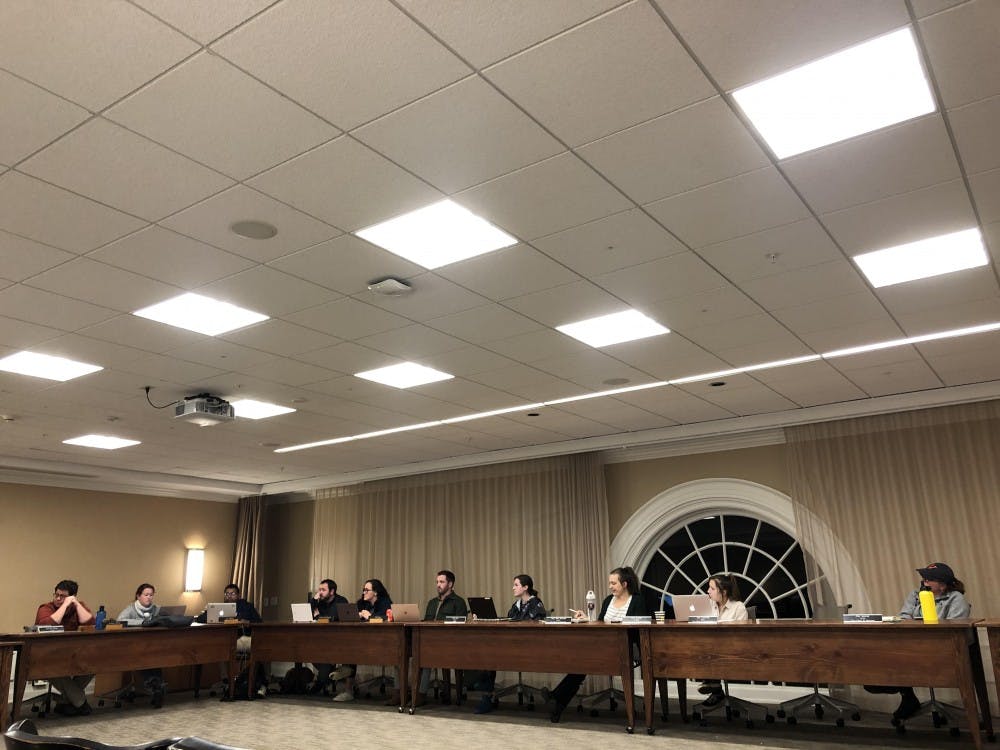Honor continued a discussion at their meeting Sunday on a proposed policy change pertaining to internal disclosure, which would require Honor members to report any disciplinary proceedings to their committee. These disciplinary proceedings include Honor trials as well as University Judiciary Committee trials, in which students are evaluated for infractions of the standards of conduct and then given a sanction — such as a reflective essay or community service — if found guilty.
The internal disclosure policy was first on the agenda and was proposed by Lillie Lyon, a fourth-year College student and chair of Honor.
This proposed policy would change the code of ethics so members of Honor would have to disclose to the Committee whether or not they are in disciplinary proceedings from another University organization, such as the UJC. Lyon came into her term with the idea of proposing this policy and said that making it a reality has been a collaborative effort with other Honor members.
After gauging general interest, Honor has deliberated on the specifics of the policy at its past three meetings. The policy is not yet officially passed and Lyon said details may change as the Committee continues to discuss. These details include what exactly will be disclosed, who will be disclosed to, and what will happen after these disclosures are made.
Lyon said she hopes that the Committee will come to a final decision on implementing the policy at next week’s meeting. Although an amendment to Honor’s code of ethics does not require a formal vote of the committee, Lyon thinks it is appropriate to seek a consensus from the whole group.
“If there aren’t any unexpected concerns raised about where we’ve landed, our Policies and Procedures subcommittee will draft up language for the code of ethics about what this policy will look like and then we’ll vote on it as a group,” Lyon said. “If the group’s in favor, it’ll be entered in the code of ethics. If the group is not in favor, we’ll figure out what happens next.”
Mary Beth Barksdale, a fourth-year College student and vice chair of education on Honor, offered her opinion on the policy and how it is relevant to the purpose of Honor during Sunday’s discussion.
“Being a support officer is a privilege, not a right necessarily,” Barksdale said.
Barksdale emphasized that Honor has a “greater duty” to other students than they have to themselves. The difference between the privilege of being an officer and the “right to be a student” is an important distinction in her mind.
Alex Spratley, a fourth-year College student and the vice chair for hearings of Honor, echoed a similar sentiment to Barksdale’s.
“It is important that this is something we have in place for the sake of the students going through our process,” Spratley said.
Generally, there is a consensus among the Honor Committee that disclosing this information, in principle, is important to secure the safety and trust of people they are working with.
The Honor Committee adjudicates offenses that are considered significant acts of lying, cheating and stealing, in which the accused student had knowledge of that act. This system is entirely operated on the principle of student self-governance, so students serve as committee members, support officers and jurors of Honor trials.
Within the context of this policy, a disclosure means that support officers and committee members — those who deal with Honor cases — would be obligated to inform a member of the Honor committee, which would incur a possible suspension from Honor duties.
Violations of the code of ethics go to the standards panel, who determine if the violator is “fit to continue serving.” Possible results include a warning, probation or a possible removal from the pool entirely.
Spratley noted she doesn’t think it will have much impact on support officers as a whole because this isn’t something they hope to encounter too frequently.
Lyon said she is unsure of the day-to-day implications of the policy on the operation of Honor but still sees a need to have the infrastructure to deal with these issues in place.
“When it comes to these sorts of issues, hopefully it will give people some peace of mind that both within Honor and outside of Honor, these concerns are being brought to attention and that they are being handled to the best of our ability,” Lyon said.







